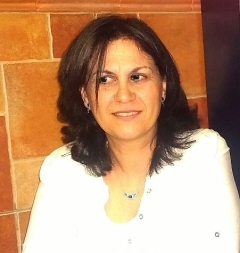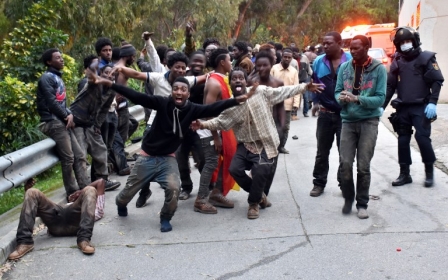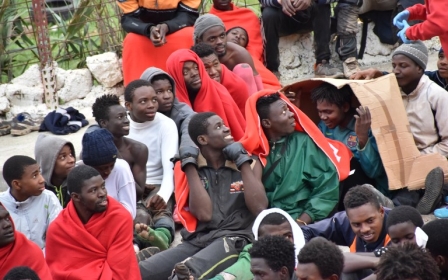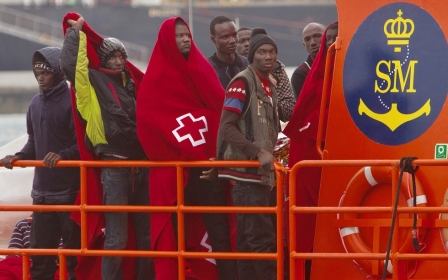Helping Syrian refugees one phone call at a time
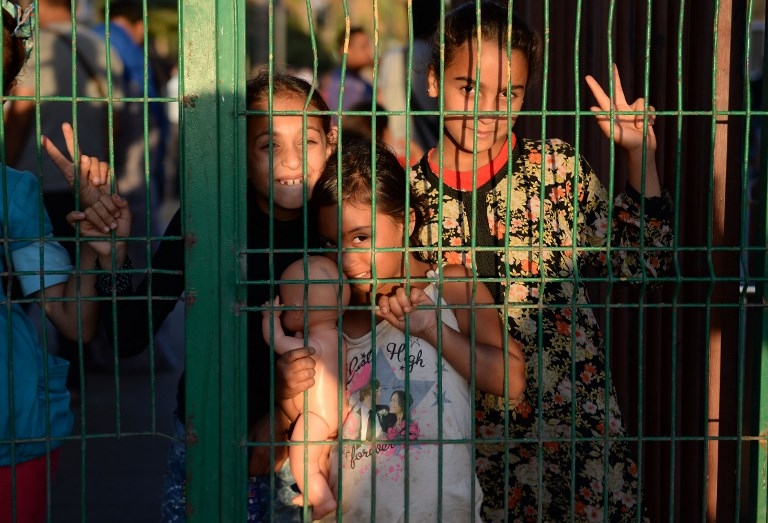
MADRID - In a peripheral neighbourhood of Madrid, Souad Benkaddour scrolls through her WhatsApp messages.
"This Syrian man texted me yesterday," said the 53-year-old Moroccan, who lives with her husband and two children. Benkaddour begins to translate the message from Arabic to Spanish. "First, he wishes me a happy Ramadan and then asks me if I can help him get asylum."
Although the numbers of such requests have fallen recently, she still receives at least two phone calls a day from refugees asking for her help.
Benkaddour has learned all the ins and outs of what to do when it comes to assisting refugees.
"I have told him how to get to the social services centres in Madrid and exactly what he should ask for when he is there," she said.
"Some people think I work for an NGO and that I have [a] lot of influence, but I don’t. I just provide people with information," she added.
Helping refugees by providing them with information has become a full-time job for the house wife, though the majority of refugees do not intend to stay in Spain and want to move on.
For months, at the peak of the Syrian refugee crisis, Benkaddour’s phone was ringing non-stop. "I got so many calls. It was impossible to answer all of them," she explained. "There were weeks when I was busy helping refugees from seven o’clock in the morning to late at night. I barely had time to eat."
From Morocco to Spain
Over the past year and a half, she has helped hundreds of refugees who are crossing through Spain on their way to northern Europe.
She picks them up from the bus station and finds them a place to sleep through friends or volunteers, or simply just listens compassionately to their stories. She also provides them with information on how to seek asylum in countries like Germany, which is a desirable destination for many refugees.
'There were weeks when I was busy helping refugees from seven o’clock in the morning to late at night. I barely had time to eat'
-Souad Benkaddour
Benkaddour was born into a large family in the northern Moroccan city of al-Hoceima. She started working for a small family business selling tobacco and stamps when she was 15.
Even though her parents were modern and tolerant, Benkaddour knew from very early on that she did not fit into Moroccan society.
"Morocco is a male-dominated society. I, on the other hand, am a very independent woman with [a] strong will. I have therefore always known I wanted to move to Europe, so I could live the life I wanted for myself."
It was not until she was 37, however, that she moved to Madrid to live with her Spanish husband.
'You just want to do something'
Over a coffee, Benkaddour tells Middle East Eye about the first time she helped a refugee, which was back in September 2015. She and her husband were on their way to the small Spanish town of Segovia, when they got a call from a neighbour asking her if she would be able to translate from Arabic to Spanish.
'My neighbours wanted to help [a Syrian pregnant woman] but didn’t understand a word she said'
- Souad Benkaddour
"My neighbours had met a pregnant Syrian woman at the bus station in Madrid. It was obvious to them that the woman was a refugee with nowhere to go. My neighbours wanted to help but didn’t understand a word she said," she noted.
Benkaddour's native language is Berber, but she also speaks Arabic fluently.
"I told my husband to return to Madrid immediately. I had wanted to help for quite some time. When you see all those horrible images from the war in Syria, you just want to do something."
Because of Benkaddour and her neighbours, the Syrian woman was able to continue her journey to Germany. "We bought her a phone and a bus ticket to Belgium, where she knew people who could help her get to Germany."
They discovered that this Syrian woman was one out of many refugees who were sleeping in the park across the Mendez Alvaro bus station, in southern Madrid.
By working together, they arranged shelter for many of them and got them off the streets.
One call led to another
After this Benkaddour started receiving calls from other refugees asking her for help. "The first woman I helped gave my number to other refugees, who in turn passed on my number to others."
Through word of mouth, Benkaddour became popular among refugees. She picked them up from the Mendez Alvaro bus station almost every day for several months.
"At a certain point I was even known among the employees of the Alsa bus company. They would call me if a refugee wanted to buy a bus ticket and needed a translator," she said.
When you see all those horrible images from the war in Syria, you just want to do something'
-Souad Benkaddour
While she initially tried to help everyone find shelter, the process led to many problems with the Spanish hosts who she found for the refugees, but Benkaddour refused to elaborate.
"It was so complicated," she said. "I tried to find Spanish families to host them. Arab and Spanish culture are very different, however. So that sometimes led to problems, but I don’t want to say anything else about that."
At the peak of the refugee influx, hundreds of thousands of Syrians travelled to Europe to escape the war in their country. Many of them entered Spain through the Spanish enclave of Melilla, in Morocco.
Moving on from Spain
The majority of refugees, however, had no interest in staying in Spain. According to the European Union’s statistical office Eurostat, in 2015, out of 300,000 refugees requesting asylum in Europe, only 2,975 applied to stay in Spain.
'[The refugees] all wanted to go to Germany
'-Souad Benkaddour
"They all wanted to go to Germany," Benkaddour noted. "We did give them information about organisations which could help them settle here in Spain, but they were just not interested," she said.
The low number of asylum applicants in Spain is due to an unemployment rate of almost 19 percent, and the government's less than welcoming refugee policy.
In late 2015, Spain finally agreed to take in over 16,000 refugees from the 120,000 refugees it was supposed to take under an EU quota system, succumbing to public pressure and criticism from other European countries.
But the country barely met its target with only 1,100 resettled in Spain until February 2017, while more than 30,000 were offered sanctuary in Germany in 2016 only.
While she still spends at least five hours a day answering phone calls and helping people, the number of refugees arriving at the Mendez Alvaro station has declined this year.
Documenting their journey
Benkaddour has never received payment for her services, but she does ask the refugees to pay it forward. "I told them, I picked you up from the bus station in Madrid. Why don't you do the same thing for someone else once you have settled in a new place?"
She has kept in touch with many of the refugees she has helped, so she knows many of them have kept their word.
Benkaddour has kept an entire archive of her work over the last year and a half.
"Those refugees I helped would often call me back and ask me if I remembered their story. Often I did not, so that's when I started to write everything down, from the day they arrived to the day they left, and where they travelled to."
She now has an entire file of WhatsApp conversations with refugees and a pile of notebooks in which she wrote down their journeys.
"All of these stories still make me upset," she says. "It’s still too recent, but who knows, maybe one day I will sit down and write a book about it."
Middle East Eye propose une couverture et une analyse indépendantes et incomparables du Moyen-Orient, de l’Afrique du Nord et d’autres régions du monde. Pour en savoir plus sur la reprise de ce contenu et les frais qui s’appliquent, veuillez remplir ce formulaire [en anglais]. Pour en savoir plus sur MEE, cliquez ici [en anglais].


